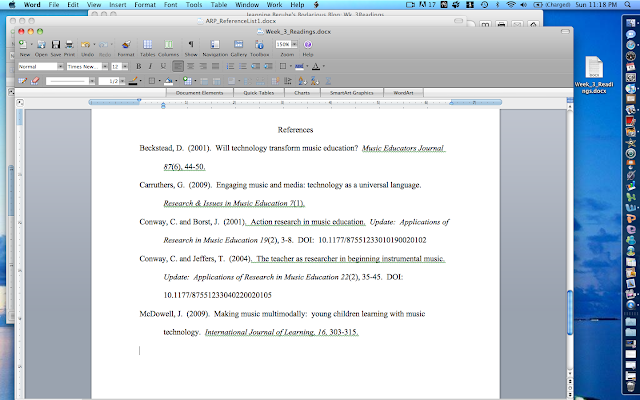Week_3_Readings
Will Technology Transform Music Education? by David Beckstead (2001)
In this article, Beckstead discusses the historical views of composition and the changing perspective it now holds in music education. In our Western culture, composers were usually viewed as the musical “elite” to which most of people would never attain (Beckstead, 2001).
In American music education, composition is most often neglected in class. However, in Great Britain, composing/composition now encompasses nearly 1/3 of the music curriculum at all levels. This is mainly due to the shift of thinking about composition. To the Brits, what is most valuable is the creative process in making music, rather than the traditional concern of notation and performance. That is keeping music in the realm from which it originates, the realm of sound (Beckstead, 2001).
Unfortunately, after a thorough historical and philosophical overview of composition, Beckstead does not answer the question posed in his title. He discusses the nature of technology in music as either being a tool of efficiency or transformation. In Britain, it is transformative. In America, it is still used for efficiency. Perhaps it is best the question is not answered by Beckstead, but rather should be answered by those who are daily in the classroom, looking for the best way to reach their students.
Engaging Music and Media: Technology as a Universal Language by Glen Carruthers (2009)
Music and technology are compared and contrasted in this article by Carruthers. Specifically, both music and technology are seen as “engaging.” “And of course engagement is the core to effective learning,” (Carruthers, 2009).
Following the comparisons, Carruthers discusses the uses of technology, and does in fact reference the article above by Beckstead-efficiency or transformation! Carruthers continues his discussion as he talks about the “democratizing power of technology,” (Carruthers 2009) in that technology makes music available to everyone at all levels of participation-composer, performer and listener (Carruthers, 2009).
Action Research in Music Education by Colleen M. Conway and James Borst (2001)
According to Conway and Borst, the majority of music educators have little concern for what research is being completed in music education. Conway suggests that music teachers can benefit from becoming involved in action research. She then shares her experiences in the completion of her own action research.
I chose this article because it was one of 3 that I found that was directly related to elementary music and action research. Perhaps there are more articles out there, but I am having great difficulty in finding them. However, Conway and Borst provide an example and discuss the process in which action research can be completed. It serves as an example of what my own research may look like.
The Teacher as Researcher in Beginning Instrumental Music by Colleen Conway and Tom Jeffers (2004)
This article again describes an action research project at the elementary level in music. However, this research was completed in collaboration with a university and public school system. It was used as a tool for professional development.
Again, it was stated, “that the action research model has been under-represented in music education as a design for research,” (Conway & Jeffers, 2004). Conway is co-author of the article listed above on Action Research. This article is now 3 years hence. Citing the article from Janet McDowell, dating 2009, it seems that few music educators are heeding the call to complete research. It is apparent that the research that I (and my fellow students at Full Sail University) will be conducting proves to be very necessary and may serve to fill in some of the gaps that exist in this field of research.
 |

No comments:
Post a Comment